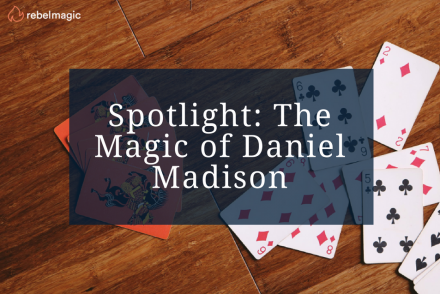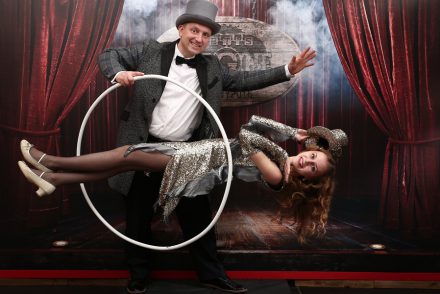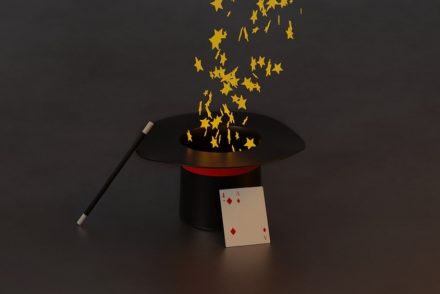A desire to learn how to do magic is a calling. People loved to be shocked and amazed, and society continues to be delighted by magic shows even as they have grown more and more cynical over the years. Hollywood films like The Illusionist or The Prestigeindicate there is a market for the stories and the mythos that accompany the mysteries of the world of magic.
Magic has experienced many transformations over the years, and it will continue to evolve as magicians invent new tricks and upstage themselves. But before you begin filling up notebooks with tactics for how to make the Statue of Liberty disappear, it's important to do some foundational preparation. Becoming a great magician takes a lifetime of dedication, practice and constant learning. This article will give you some simple tricks to keep in mind as you begin to learn how to dazzle your friends with the art of magic.
How to Do Magic
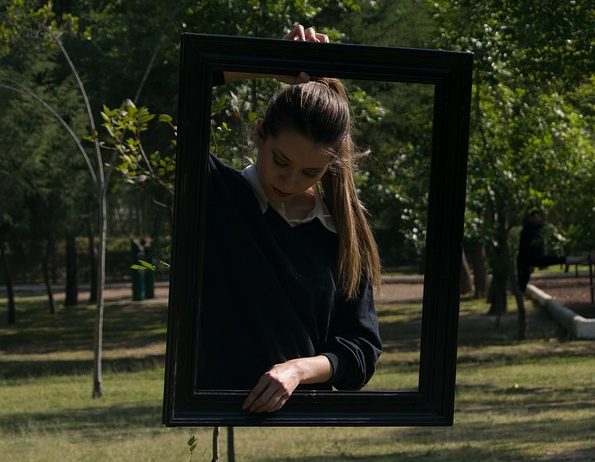
image source: pixabay.com
The world of magic has become very broad and now incorporates many other disciplines. There are many tactics you can use to augment your magic skills and dazzle your audience. The fundamental thing for you to understand is that it is your job to entertain. The more dazzled, inspired, or off-guard your audience is, the easier it is to get them to succumb to your powers.
Even a magician with poor magical skills can give a great and highly entertaining performance. There is no magical formula for being entertaining. Some shows utilize different elements to a greater and lesser degree. As a magician, you have the flexibility to design your show so that it brings the greatest enjoyment to your audience. Remember, too, that every audience is different, and what works in one venue may not work in another. Always be ready to adapt and listen to the reactions of your crowd. Give them what they want to see and when they respond positively, give them more of the same.
Some common tactics for making a show entertaining are:
CONFIDENCE
SEX APPEAL
HUMOR
TENSION
EFFECTS
PROPS
GESTURES AND SHOWMANSHIP
So You Want to Be a Magician?
Developing your stage presence is a critical component, but as you gain in confidence in your abilities, it's important to consider specialization. There are many types of magicians, and as you start to recognize your strengths and weaknesses, you can consider an area of specialization. Remember that the best way to dazzle an audience is to give them something they have never seen before; but creating something new is often simply figuring out a way to rearrange tactics and displays that have proven effective in the past.
Some types of magicians are:
Prestidigitator
Prestidigitator is derived from the Latin words for nimble and fingers. Sleight-of-hand and conjuring tricks are the work of prestidigitation. The classic trick your grandpa used to perform of pulling a coin out from behind your ear is a basic example of prestidigitation. For all magicians, a certain familiarity with sleight-of-hand tricks is to be expected. As you first begin your journey into the world of magic, you'll probably find yourself practicing with cards or coins to hone your skills.
The downside of prestidigitation is that hand tricks are subtle and can be difficult to present to a large crowd. This can be overcome with the use of screens, but it's generally more effective to interact with an audience directly rather than to force them to pay attention to a projection. Juggling can be a great way to develop your hand-eye coordination and incorporating a few moments of juggling into any magic routine can be a welcome highlight to any magic show.
One of the positive things about prestidigitation is that it can be practiced virtually anywhere with nothing more than a coin or a deck of cards. Prestidigitation requires the same flexibility and muscle control as playing a musical instrument. As you develop your skills, you must learn to maintain and care for your fingers. Learn to massage your hands to keep them from cramping and stretch them to improve flexibility.
Prestidigitation is a good way to practice the showmanship and misdirection of stage performance because, unlike your full body, you can observe how your hands look when you perform. Practice finger flutters that look natural, or seem to have some purpose beyond simply distracting the eye. Remember that in Victorian England many prestidigitators were street magicians by day, and pickpockets by night.
Mentalist
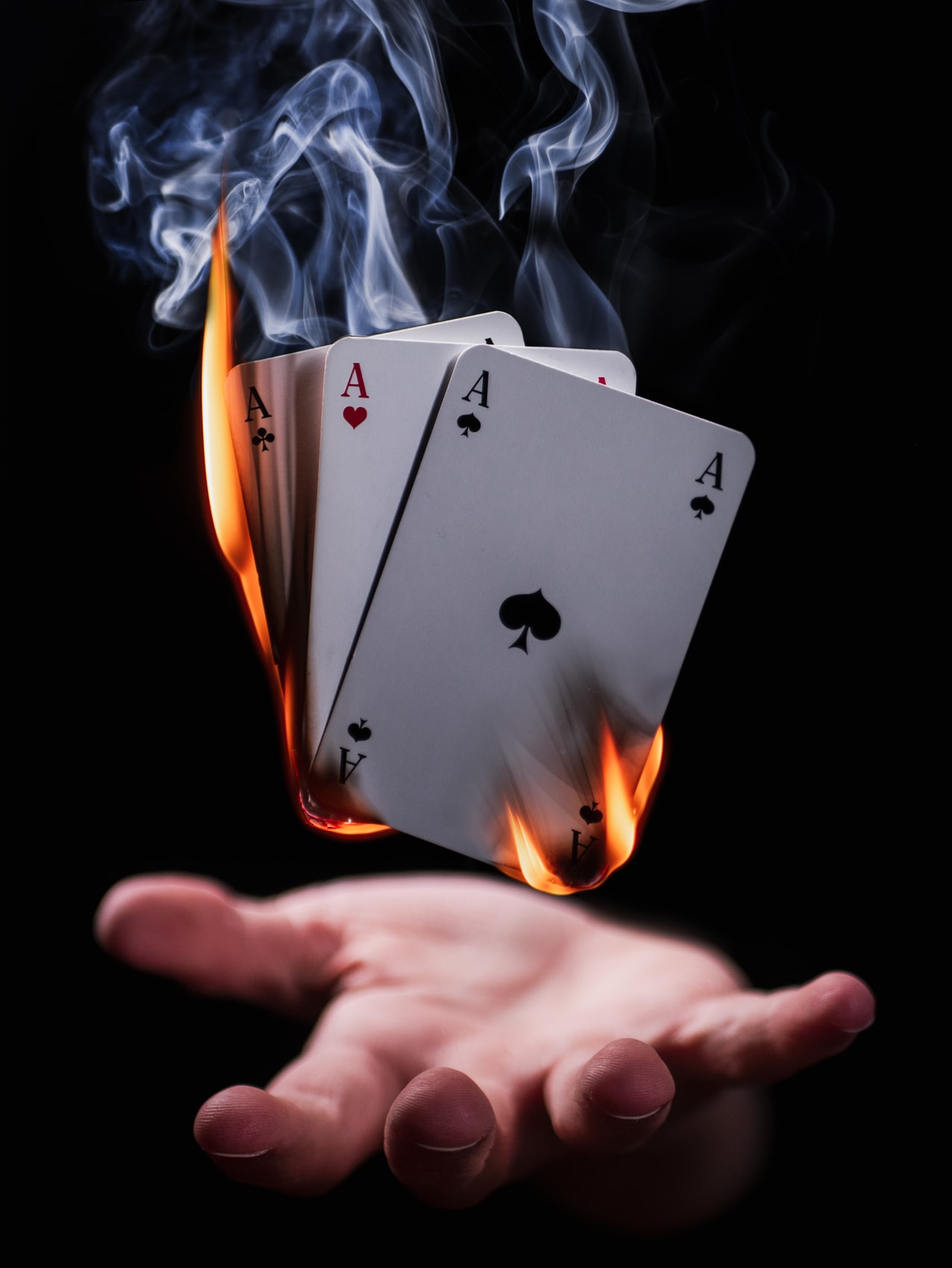
Imaage source: unsplash
It is possible to become a magician even if you have absolutely no interest whatsoever in performing card or coin tricks. Another form of magician is the mentalist, and this field ranges from fortune tellers to hypnotists. Sometimes mentalists presents themselves as having supernatural mental powers by which they can communicate with spirits or read minds.
Developing as a mentalist requires a good ability to read minimal visual cues to deduce information. Many perform by asking open-ended questions and waiting for a subject to respond. Other mentalists develop more precise tricks that can lead to impressive revelations. Props may be used, even to the point of planting a person in the audience who is secretly in on the act.
Examples of common mentalism that most people are familiar with include viral Facebook videos in which a person claims to be able to make you think of a certain number. They then put you through a series of calculations which invariably arrive at some pre-determined number the mentalist selected. Such tricks tend to rely on numerical tricks that always produce the same result.
Even the most skeptical individuals are entertained by the concept of supernatural powers. Magicians who can create an illusion of extrasensory perception, telekinesis, or an ability to communicate beyond the grave will always receive a strong response.
Escape Artist
Escape artists represent a different type of physicality that extends to the whole body rather than just the fingers. Harry Houdini is probably the most famous escape artist, and his routine required extreme muscle control throughout his entire body. Athleticism and physical fitness are required for an escape artist. Houdini relied on various props which included water escapes. However, many of Houdini's performances were done out of sight of the audience, and relied on developing tension among all other things.
Houdini routinely escaped from straight jackets or handcuffs. One of his advantages was that he had long, narrow hands that he could contort almost down to the size of his wrist. All magicians must develop an awareness of their own unique physical attributes which they may capitalize on to astound and dazzle a crowd.
Many modern escape artist performances end by tricking the audience into believing that the escape artist has succumbed to the dangers of his or her trick. The performances usually begin with a nervous announcement detailing the difficulties of the trick as well as the multiple dangers the escape artist is subjecting himself or herself to. This is followed by an explanation of the emergency equipment that is available should something go wrong.
The build up and the tension created by the build up is more important to the successful escape routine than the actual performance. Writing a good script is critical to the escape artist. The actual escape is generally performed in a matter of minutes, with the escape artist emerging triumphant only after the audience has become convinced that he or she has succumbed to the dangers of the escape. Escape performances are still very effective forms of magical performance.
Comic Magician
A little bit of comedy is used in a lot of magical routines, but when the comedy overshadows the actual magic, the magician has moved into the realm of a comic magician. Comedy can be both physical or vocal, and these types of magicians are especially effective for afternoon acts or acts at children's parties. Aspiring to become a comic magician is a good objective for anyone who wishes to have a career in entertainment because it combines many elements of showmanship and requires a good interaction between the performer and the audience.
Street Magician
Working as a street performance is a fantastic way to develop your skills without the pressure or complication of organizing and promoting a performance. Street magicians can be found at many public places that have a large amount of street traffic. A street magician needs only to find a place and begin performingwith the knowledge that a crowd draws a crowd.
Many performers utilize street performances to develop their skills at attracting, engaging, and interacting with an audience. Street performances allow magicians to interact directly with their audience, sometimes while in physical contact. Performing outdoors in the presence of distractions such as honking cars or passing pedestrians allows street magicians to focus on their volume, inflection, and speaking rhythm.
When a magician has developed the ability to conjure a crowd from a stream of passing pedestrians, and hold their attention even among the many distractions of being out on the street, he or she will have no problem maintaining the attention of an audience in a theater. Practicing as a street magician is a great way to learn how to do magic.
Physical Endurance or Magical Art
Some create performances that are effective on a media scale rather than an interpersonal scale. For example, in 2003, David Blaine suspended himself in a transparent box for 44 days near the Tower Bridge in London. This represents a different category of performance as no audience could be expected to sit and watch the magician do nothing for 44 days. Instead, the effectiveness of the performance was its repetition as a media novelty that remained in the public awareness throughout the duration of the stunt.
This kind of physical endurance trick represents a kind of magic as performance art. The magician, in this case David Blaine, used his showmanship and magician physicality to insert himself into the daily public awareness. His action represented the kind of provocative behavior that demanded a response, and every random response from his observers became a de facto part of the act.
Blaine did not have access to food during his time in the box, and at one point observers attached a hamburger to a remote controlled helicopter to torment him. The media, clearly, had to report on such behavior, and it served to keep Blaine in the public eye by injecting a certain random element to his escapade.
How to Do Magic in Your Community
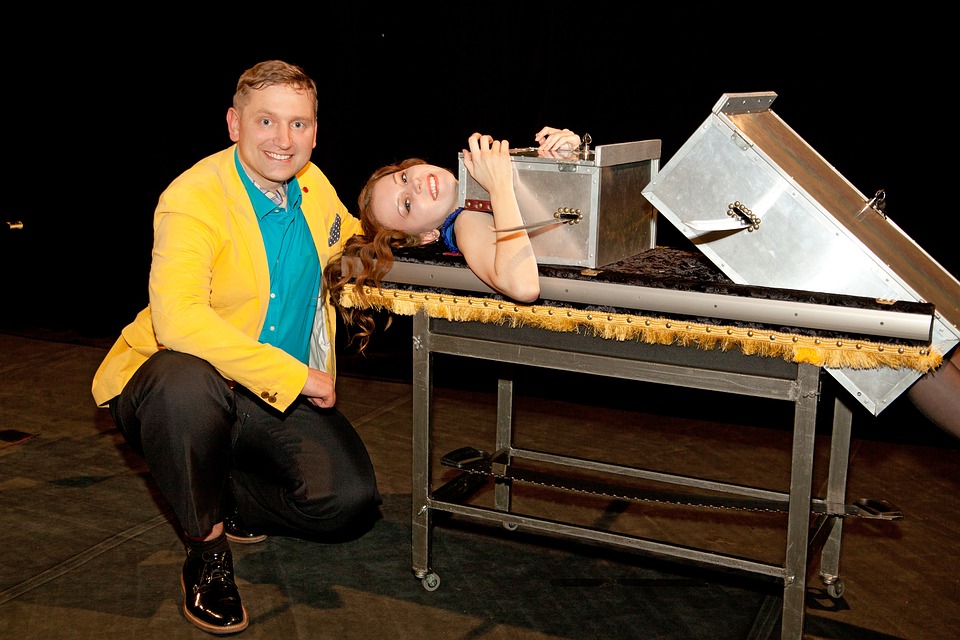
image source: pixabay.com
Your quest for how to do magic must begin somewhere, and chances are there are experts in your local community that will be only too happy to help you. Magic can sometimes seem like a fringe occupation, but it's amazing how many highly developed communities exist just outside your door. Here are some tricks that will help you learn how to do magic no matter where you are.
Visit the Library
As you begin your quest to become the next Harry Houdini, you'll find that books are a tremendous resource. Your local library likely has a large section on magic that will allow you to develop the initial skills necessary for how to do magic. A library is a great resource since it allows you to learn how to do magic without incurring any cost. Also, every different form of magic will be available to study at your local library.
In addition to the library, you should also familiarize yourself with YouTube videos. Detailed instructions exist that will give you practice techniques that will have you fooling your friends in no time.
Purchase Magic Tricks
No products found.
Magic stores or online sellers have a wide variety of starter magic kits that you can purchase. Although many of these aren't appropriate for use in a professional show, they will give you a good basis for understanding the mechanics of basic magic that will serve as a foundation when you start to conceive of your own tricks.
Be sure to read as many reviews as possible so you're sure to get the best possible starter kit. Remember to always begin with the low-cost items so that you can gauge if your interest is a flight of fancy or the beginning of a lifetime of dedication.
Find the Local Magic Community
Believe it or not, most communities have thriving magic networks where people can go and share tips or practice their tricks. You can find these groups online or on social media. Also, don't be afraid to approach established magic businesses or performers. Many businesses offer internships, which can be a great way to pick up cutting edge industry secrets that haven't yet made their way into books.
Practice
Practicing your skills has to become as fundamental as brushing your teeth, even more so as you should be practicing even when you're not consciously aware of it. Remember: your goal as a magician is to entertain through misdirection, and you have to be flawless in your performance. The sooner you get to a level where you're able to perform all your tricks from muscle memory without dedicating any conscious thought to the matter, the more confident and effective a performer you will be. Practice is the key for how to do magic.
A World of Magic Awaits
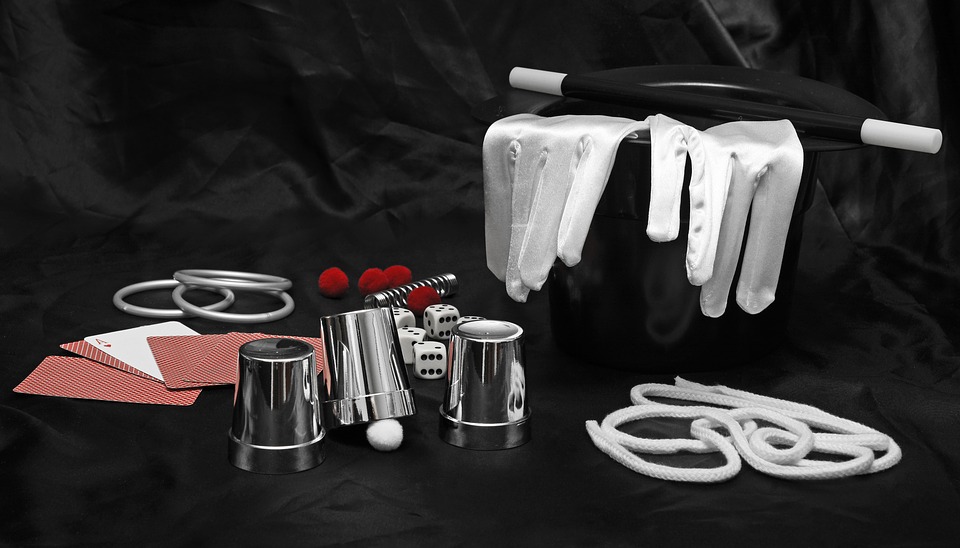
image source: pixabay.com
When you consider how to do magic, remember that above all it is a performance. Even individuals who are skeptical of your abilities will be grateful if your performance leaves them satisfied and entertained. The skills that you need to be a good performer are similar to the skills that you need to become a good musician, writer, athlete, actor, or comedian. Magic can be a great starting point for a career in show business because it utilizes so many skills and abilities that are used in other disciplines.
Learning how to do magic can begin with something as simple as opening a book and can lead you to a performance that can gather worldwide attention. But even if you aspire to be known on a global scale, remember that some of the most effective tactics for how to do magic involve the fundamentals of showmanship. Know your audience, captivate them, be confident, and have a well-conceived performance. Above all, be able to adapt your performance to suit the preference of the crowd, and practice until you can perform your act in your sleep. The most fundamental thing about how to do magic is this: be entertaining!
Featured photo via Pixabay
Last update on 2024-04-22 at 23:01 / Affiliate links / Images from Amazon Product Advertising API

